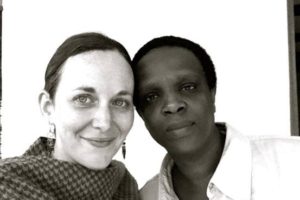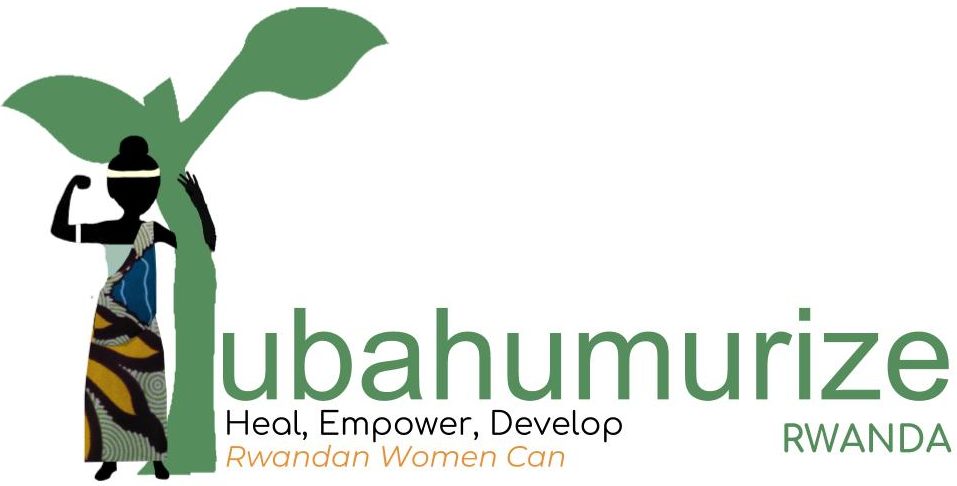
Volunteer Simone Hanchet with Tubahumurize Trauma Counsellor Charlotte Karikwera
26 February 2015
Among the vulnerable women with whom Tubahumurize works, those who were raped during the genocide are undoubtedly among the most disenfranchised.
This week, I was invited to accompany Charlotte Karikwera, Tubahumurize’s trauma counsellor, in a group counselling session for ten such women.
The women in this group are further united by the fact that each bore a child as a result of rape during the genocide. Because of the persistent taboo of rape in Rwandan society, most have gone twenty years without speaking about their experiences. Only now, in the emotional safety created by the group counselling context and in the presence of others who have suffered similarly, are they beginning to voice what they have lived through.
To be invited into that deeply intimate space was a huge privilege for me. Listening to the women share their stories (with the help of a whispering translator) provided me with a window into a world of suffering and of strength that bears little semblance to my own life of ease and relative comfort back in Canada.
During the two-hour session, the women, seated in a close circle in a quiet office space in central Kigali, took turns listening and speaking. What they revealed was extremely difficult for them to share. It was also difficult to hear. They were at times shaking visibly as they spoke, rocking back and forth, staring into space, crying, and moaning. A tall, graceful woman of about my age kept tapping her head, as if the images it contained could be dislodged. At one point, the group fell silent and all we could hear was the thunderstorm raging outside, rain falling heavy on the roof.
Because their stories were extremely difficult to share, and because they chose to share them in my presence, I feel compelled to relay some of what I heard. Not all of it, though. Some things that these women said are simply too intimate – and too horrible – to cast into the impersonal ether of the Internet. A writer would have to be either far less sensitive or far more skilled than I am to do justice to everything that was said that day.
The women shared with one another experiences of being kept alive during the genocide simply to be raped. Some were just young women at the time – one was only 13. Others were already mothers, and saw their husbands and children hacked to death in front of their eyes before being taken away, gang raped and left for dead.
Here are just some of the phrases that were spoken over the course of the session:
- I wear this wedding ring so that men will never come near me again.
- I knew him well. I was his brother’s Godmother.
- First, they bore a hole into my belly to take out the child they thought I was carrying. But in truth, I was still a virgin – just a little girl – at that time. Then, they raped me and I became pregnant.
- I cannot bend down to tie my own shoes because of the scarring from the cuts. That is why I always wear these flip-flops.
- They did it so many times that I lost count.
- To this day, I cannot stand the smell of semen, and fulfilling my duties to my husband is a nightmare.
- I cannot look at my child’s face without remembering everything.
- After the men were all finished with me, I was raped by the boy.
The almost unfathomable humiliation and pain that these women experienced during the genocide has been compounded by its lasting consequences. For the past twenty years, they have been living with the profound physical and psychological trauma and shame of having been raped, with the humiliation of having been hunted as non-humans, and with the many challenges of a life of grinding poverty. Almost all have also been living with HIV, contracted from their rapists, and with the trauma of having witnessed the murder of loved ones.
On top of all this, the women in this group have spent the past twenty years raising children born of their rape. The task of raising these children, embodied reminders of what they lived through, is even more difficult when the children physically resemble the men who raped them. These women’s relationships with their children, known in Rwanda as “fruits of hatred”, are deeply troubled. Two women shared that they were unable to love their children, despite having done their best to provide for their material welfare. One woman in the group shared that her own family rejected her because of the child she bore. Another told the group how she was beaten and ultimately rejected by her husband because of the pregnancy.
The group counselling session I witnessed was the second in a series of ten sessions designed by Tubahumurize to guide women through a process by which they can come to terms with their difficult pasts, find strength in their solidarity, and develop new coping tools for the future.
Charlotte explains that future sessions with this group will invite the women to go deeper into what they experienced. Not all the women in the group have chosen to share their stories yet. What is more – and this is almost unbelievable to me – Charlotte assures me that most of the women who have shared have held back the most brutal parts of their stories. These can only come out over time.
The process will also provide women with concrete tools for recognizing and dealing with their physical and psychological symptoms of trauma. And together, the group will explore in depth their shared challenge of raising children born of rape.
Tubahumurize supports six similar groups at any given time, and has been running such group counselling sessions for women victims of violence for almost a decade.
After completing Tubahumurize’s group counselling program, most women report significant improvements in their mental health. The opportunity to verbalize what they have lived through in a safe, supportive female-centred space sets in motion a healing journey. Because of the group structure, women’s deep sense of isolation is gradually replaced by a sense of community, of mutual understanding, and of encouragement. In time, some of these women may be integrated into Tubahumurize’s other programs, including micro-credit loans, human rights education, and vocational skills training.
I believe there is great wisdom in Tubahumurize’s group counselling approach: with the guidance of a trained counsellor, these women are able to support and accompany one another in a therapeutic journey back from a Hell that few others can even begin to understand. Twenty years after the genocide, this kind of trauma counselling remains vital to Rwanda’s healing. It is sad that many similar women in this country have not yet had access to such an opportunity. I wonder how many stories like the ones I heard this week are still untold…
I was also struck by how resilient these women are. It is a testament to their strength of character that they have kept going despite everything they’ve experienced, that they have managed to raise their children, and that they found the courage to participate in this program. I can hardly even imagine being as strong as they have had to become.
And yet, it would be trite and far too easy to conclude that despite what they have suffered, these women’s resilience, coupled with trauma counselling, is solving all their problems.
And it would be an absurd understatement to say that they have experienced terrible injustice in their lives. These women have been on the receiving end of many of the ugliest, most hateful things that people can do to other people. Their experiences during the genocide were almost unspeakable and unbearable, and their lives since that time have been marked with illness, grief, suffering, and near constant struggle. It feels outrageous to me that so many of them shared that they would be returning from the counselling session to husbands who beat them regularly, to family members who despise them, to the anxieties of living with HIV, and to the incessant worries of extreme poverty.
Far, far more can and should be done to help these women. With additional resources, Tubahumurize would be able to more fully support and empower the women I met this week – and the many others like them – through access to micro-credit loans, through entrepreneurship training, and through additional educational programming.
An easy life may be too much to ask for them, but perhaps a less difficult one is within reach. Surely, these women deserve this chance.
